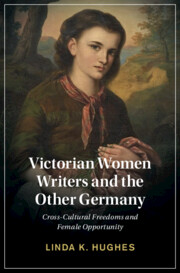Book contents
- Victorian Women Writers and the Other Germany
- Cambridge Studies in Nineteenth-Century Literature and Culture
- Victorian Women Writers and the Other Germany
- Copyright page
- Dedication
- Epigraph
- Contents
- Figures
- Acknowledgements
- Preface/Vorwort
- Introduction
- Chapter 1 Entrée to the ‘Other’ Germany
- Chapter 2 Germany through a Female Lens
- Chapter 3 Networked Families in Germany
- Chapter 4 An Unbeliever in Germany
- Chapter 5 The Anglo–German Fiction of George Eliot and Jessie Fothergill
- Chapter 6 New Woman Travellers and Translators
- Chapter 7 An Anglo–German Expatriate–Citizen
- Chapter 8 Queer Borders
- Nachwort/Afterword
- Notes
- Bibliography
- Index
- Cambridge Studies in Nineteenth-Century Literature and Culture
Chapter 7 - An Anglo–German Expatriate–Citizen
Elizabeth von Arnim
Published online by Cambridge University Press: 02 June 2022
- Victorian Women Writers and the Other Germany
- Cambridge Studies in Nineteenth-Century Literature and Culture
- Victorian Women Writers and the Other Germany
- Copyright page
- Dedication
- Epigraph
- Contents
- Figures
- Acknowledgements
- Preface/Vorwort
- Introduction
- Chapter 1 Entrée to the ‘Other’ Germany
- Chapter 2 Germany through a Female Lens
- Chapter 3 Networked Families in Germany
- Chapter 4 An Unbeliever in Germany
- Chapter 5 The Anglo–German Fiction of George Eliot and Jessie Fothergill
- Chapter 6 New Woman Travellers and Translators
- Chapter 7 An Anglo–German Expatriate–Citizen
- Chapter 8 Queer Borders
- Nachwort/Afterword
- Notes
- Bibliography
- Index
- Cambridge Studies in Nineteenth-Century Literature and Culture
Summary
Three Anglo–German Edwardian novels of Elizabeth von Arnim, Adventures of Elizabeth in Rügen (1904), Princess Priscilla’s Fortnight (1905), and Fräulein Schmidt and Mr Anstruther (1907), perform expatriate identity as theorised by Edward Said. Elizabeth and Her German Garden (1898), in contrast, is the most English of early novels by English-born German citizen von Arnim. The restlessness and contrapuntal perspectives of expatriate consciousness generate humour in the 1904 and 1905 novels, and in-depth adoption of an alternate German–Anglo subjectivity in Rose-Marie Schmidt. Fräulein Schmidt, von Arnim’s most sophisticated novel to that point, adopts the first-person epistolary narrative of a German professor’s daughter reared in a lower-middle-class home as she finds independence, self-respect, and a writer’s voice after being proposed to, then jilted, by a young Englishman. A subliminal narrative coursing beneath the surface of Rose-Marie’s letters limn the protagonist’s underlying psychological processes.
- Type
- Chapter
- Information
- Victorian Women Writers and the Other GermanyCross-Cultural Freedoms and Female Opportunity, pp. 162 - 186Publisher: Cambridge University PressPrint publication year: 2022

